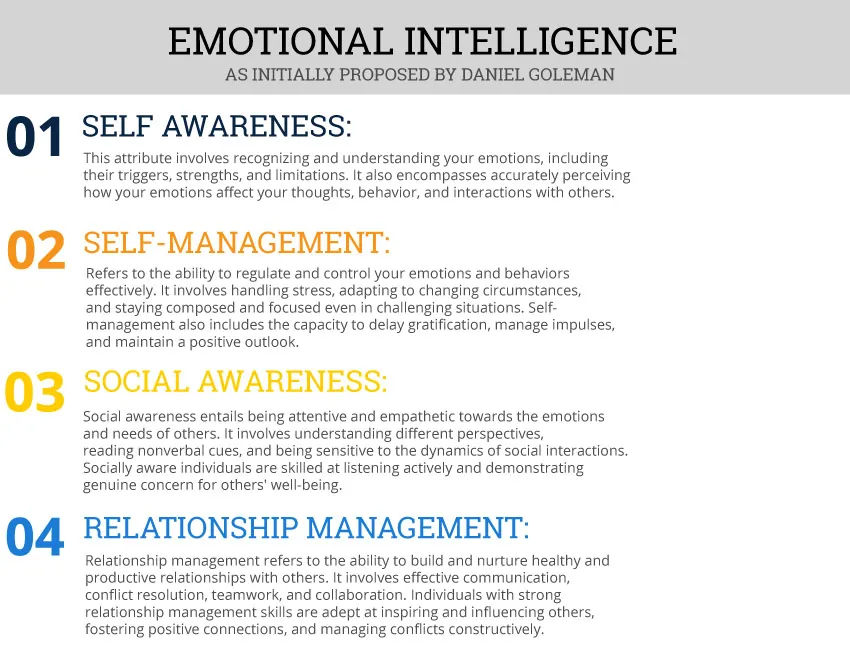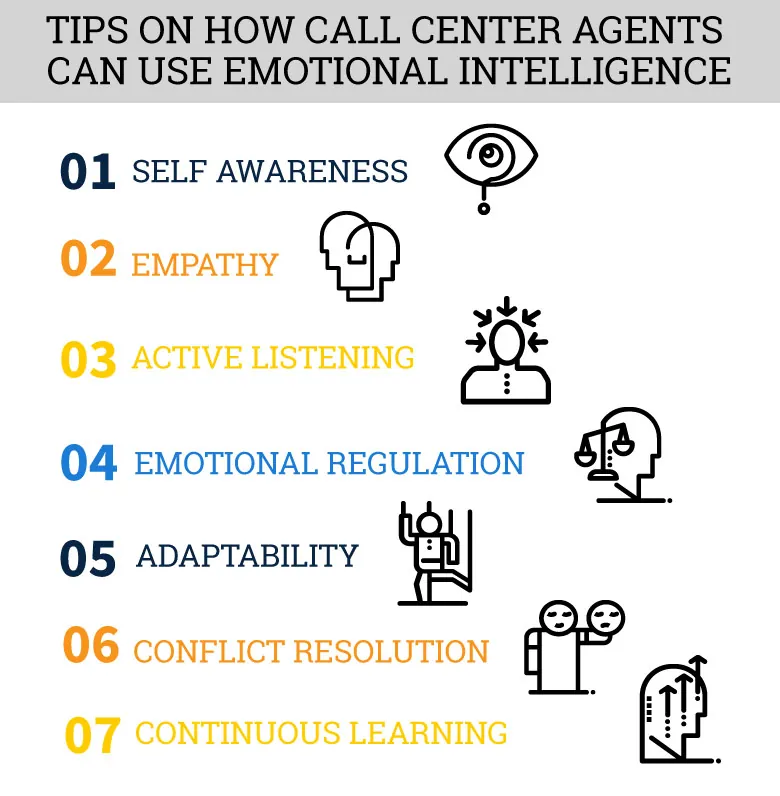In recent years, there has been a pivot towards emphasizing Emotional Intelligence (EI) in call center interactions. This blog explores how integrating emotional intelligence in the call center does not merely address issues but rather builds lasting relationships with customers, ensuring a tangible impact on overall service quality.
Recognizing the immense value of emotional intelligence is not just a trend; it's a strategic maneuver to improve customer satisfaction. Call centers that invest in emotional intelligence stand to revolutionize how they connect with customers, ensuring interactions are efficient, empathetic, and personalized. Moreover, mastering EI can lead to personal growth and professional development, empowering your team to excel in their roles.
SQM research shows that 88% of people have stopped doing business with a company due to poor call center customer service. This statistic alone should motivate companies to train their agents on emotional intelligence skills, which have been proven to be correlated with high-quality customer service.
What Is Emotional Intelligence?
Emotional intelligence (also known as emotional quotient or EQ) is the ability to understand your and other people's emotions and to manage your emotions positively to communicate effectively and maintain good relations. In 1990, researchers John Mayer and Peter Salovey coined the term EI, but psychologist Daniel Goleman later popularized it.

These four attributes collectively contribute to emotional intelligence, enabling individuals to navigate their emotions and relationships successfully.

How Can Emotional Intelligence Improve Customer Service in the Call Center?
Emotional intelligence (EI) is crucial in managing interactions within a call center environment. It involves the ability to recognize, understand, manage, and use emotions positively to communicate effectively, empathize with others, overcome challenges, and defuse conflict.
EI can differentiate between a successful interaction and a dissatisfied customer in a call center, where agents often deal with a high volume of calls and a range of customer emotions.
Here’s an excellent example that demonstrates how EI improves customer service and Csat in the call center:
An agent named Sarah works for a telecommunications company. One day, Sarah receives a call from a customer who is extremely frustrated because their internet service has been down for several hours, affecting their ability to work from home. The customer is agitated and demands immediate resolution.
With a high level of emotional intelligence, Sarah recognizes the customer's frustration and listens attentively without becoming defensive. She acknowledges the inconvenience the customer is facing and expresses empathy for their situation. Instead of simply following a scripted response, Sarah uses her EI skills to connect with the customer on a personal level.
Through active listening and effective communication, Sarah manages to de-escalate the customer's anger and assures them that she will personally follow up on the issue to ensure a swift resolution. Despite the customer's initial hostility, she keeps her tone calm and professional throughout the conversation.
After resolving the technical issue and ensuring the customer's internet is back up and running, Sarah follows up with a courtesy call to check if everything is working smoothly. The customer is impressed by Sarah's genuine concern and proactive approach, leading to a positive experience despite the initial frustration.
In this example, Sarah's emotional intelligence was pivotal in managing the interaction effectively. By recognizing, understanding, and managing emotions—both her own and the customer's—Sarah was able to turn a potentially negative situation into a positive one, enhancing customer satisfaction and loyalty to the company.
If Sarah had not acted in an emotionally intelligent fashion, this situation could have quickly escalated and resulted in a very angry or upset customer. Proper training can ensure that agents understand how to remain calm in tense situations and communicate effectively to help manage customer interactions.
Emotional Intelligence allows agents to connect with customers on an emotional level, fostering a better understanding and responsiveness to the customer's needs and concerns. This connection is vital, as customers are more likely to remember how they were made to feel rather than the details of the conversation itself.
SQM research shows that 87% of customers view tone of voice as the most important aspect of the customer communication experience. This statistic alone demonstrates that call centers must ensure their agents have strong interpersonal skills to deliver high Csat.
Agents skilled in EI are adept at managing both their own emotions and influencing the emotions of others, which can lead to higher customer satisfaction and loyalty.
How to Incorporate Emotional Intelligence in the Call Center
Emotional intelligence plays a crucial role in call center agents' success in delivering great customer satisfaction. EI helps them effectively understand and manage their own emotions and the emotions of customers, leading to improved customer satisfaction and positive interactions.
Recent SQM Group research shows that 47% of managers feel their biggest problem operating a call center effectively and efficiently is high agent turnover, job burnout, and absenteeism. The leading cause of these problems is stress. However, when agents learn skills related to emotional intelligence, such as emotional regulation and self-awareness, to manage stress, they are much more effective at coping with stress, thereby reducing burnout and agent turnover.
Here are some tips on how call center agents can use emotional intelligence:

- Self-awareness: Agents should develop self-awareness by recognizing their own emotions and understanding how they affect their performance. They should regularly assess their emotional state and take steps to manage any negative emotions before interacting with customers.
- For instance, before starting her shift, Maria, a call center agent, takes a few minutes to reflect on her emotions. She realizes she's feeling a bit stressed due to a personal issue. Recognizing that this could affect customer interactions, she practices mindfulness techniques to calm herself and focus on her role.
- Empathy: Agents should strive to understand and empathize with the emotions and concerns of customers. This involves actively listening to their needs, acknowledging their feelings, and demonstrating understanding. Showing empathy can help build rapport and trust with customers.
- For example, when a customer calls in frustrated about a billing error, David, a call center agent, listens attentively to the customer's concerns. He acknowledges the customer's frustration and assures them he understands the inconvenience. David shows empathy by putting himself in the customer's shoes and apologizing for the error.
- Active listening: Call center agents should practice active listening, which involves giving full attention to the customer's words, tone, and emotions. They should avoid interrupting, provide verbal cues to show they are engaged (e.g., using phrases like "I understand" or "I hear you"), and summarize or paraphrase the customer's concerns to ensure accurate understanding.
- For example, during a call with a customer reporting technical issues, Sarah practices active listening. She refrains from interrupting the customer, says “mhm” and “okay” to show she's following along, and repeats key points to the customer to ensure she understands the problem thoroughly before offering assistance.
- Emotional regulation: Agents need to manage their emotions effectively, especially in challenging situations. They should learn techniques to stay calm and composed, such as deep breathing exercises or taking short breaks if needed. This helps agents respond to customers in a professional and positive manner.
- For instance, when dealing with an irate customer who is dissatisfied with a product, James uses emotional regulation techniques. He takes a deep breath before responding, maintains a calm tone, and focuses on finding a solution rather than becoming defensive or escalating the situation.
- Adaptability: Call center agents should be adaptable and flexible in their approach. Different customers may have varying emotional states, so agents should be prepared to adjust their communication style accordingly. This might involve being more patient with upset customers or using a more upbeat tone for enthusiastic customers.
- For example, Lisa encounters a customer who is grieving a loved one. Instead of sticking to her usual script, she speaks more slowly and patiently guides the customer through troubleshooting steps, keeping in mind that the customer may have trouble focusing on the conversation.
- Conflict resolution: Agents should be equipped with conflict resolution skills to handle difficult situations. This involves staying calm, actively listening to the customer's concerns, and offering appropriate solutions or compromises. Agents should focus on de-escalating conflicts and finding mutually beneficial resolutions.
- For example, when a customer expresses dissatisfaction with a service delay, John remains composed and listens actively to the customer's concerns. He apologizes for the inconvenience and offers a discount as a gesture of goodwill, effectively resolving the conflict and leaving the customer satisfied.
- Continuous learning: Agents should actively seek feedback and learn from their experiences. They can review past interactions, identify areas for improvement, and seek guidance or training to enhance their emotional intelligence skills. This ongoing learning process helps agents refine their emotional intelligence and deliver better customer service.
- For instance, after a particularly challenging call, Emily requests feedback from her supervisor on how she handled the situation. She takes note of areas where she can improve her emotional intelligence skills, such as maintaining patience during longer calls, and attends a workshop on effective communication to enhance her abilities further.
